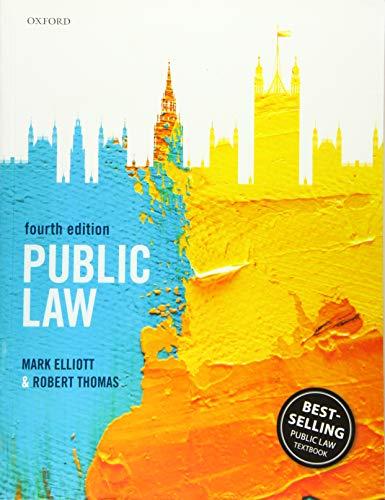Question
1. Basile v. Attorney General of Nova Scotia , [1984] N.S.J. No. 337 N.S.S.C. (App. Div.) Under the Direct Sellers' Licensing and Regulation Act ,
1.Basile v. Attorney General of Nova Scotia, [1984] N.S.J. No. 337 N.S.S.C. (App. Div.) Under theDirect Sellers' Licensing and Regulation Act,96anyone involved in the activity of direct selling (door-to-door sales) in Nova Scotia had to be a resident of that province. Mr. Basile, a bookseller and a resident of Qubec, applied for a licence to sell in Nova Scotia and was refused because he was not a permanent resident. Were he to challenge this decision, what would be his argument? Is this an infringement of the mobility rights? Does this activity fall into one of the exceptions set out in either section 6(3)(a) (laws of general application) or the reasonable limitation clause in section 1 of theCharter? If successful with hisCharterchallenge, what remedies might Mr. Basile be awarded?
2.Taisa is a massage therapist who runs a successful business from her home. One of her long-time clients, Greg, owes her a considerable sum of money relating to unpaid massage therapy sessions. Greg is reluctant to pay because he is unhappy with the services he has received. If her primary concern is to preserve her relationship with Greg, what course of action Taisa should consider? Why do you think that the suggested course of action is best in her situation?
3.Berman made a documentary on the life of musician Artie Shaw. Shaw's representative was cooperative and gave her permission to use certain songs if she received proper permission from the copyright holders. The cost of the film was funded by her own savings, a private investor, the Canada Council, the Ontario Arts Council, and deferred salaries and material costs. In March of 1987, the film won an Academy Award as the best feature documentary for 1986. In November of 1987, Shaw's lawyer contacted Berman's lawyer: "... This letter states that Artie Shaw has a 35% profit participation in the motion picture... ." If this case ends up in court what will be the most likely decision of the judge?
4.Joe, a university student, parked his car near Harry's garage and went away to attend classes. Harry had noticed that there was glass on the street when he came to work that morning and was not surprised when he saw that several of the students' cars parked in that location subsequently had flat tires. He went around when he had time during the day, to each of those cars, fixed the tires and put a bill on each vehicle charging $15 for the service. Joe had come back during the day and noticed his flat tire, and when he came back that evening was grateful that it had been fixed. He went over to the garage to thank Harry and told him that he would be happy to pay the $15, but he couldn't do it until next week. In fact, he failed to pay the money, and Harry sued him for breach of contract. Explain the likely outcome.
5.Hank rented a new ground-floor condominium for four months before the owner offered to sell it to him. Hank accepted the offer. After Hank became the owner, he built a small patio off the living room. At a house-warming party, one of his friends caught the heel of her shoe between some patio bricks and fell, breaking her arm. It took an abnormally long time to heal because she suffered from an unusual bone disease. What was Hank's liability in this case? Can his friend sue him?
Step by Step Solution
There are 3 Steps involved in it
Step: 1

Get Instant Access to Expert-Tailored Solutions
See step-by-step solutions with expert insights and AI powered tools for academic success
Step: 2

Step: 3

Ace Your Homework with AI
Get the answers you need in no time with our AI-driven, step-by-step assistance
Get Started


